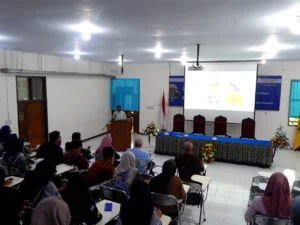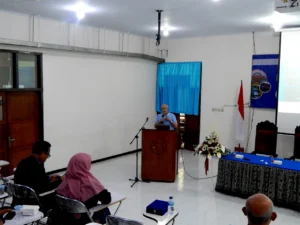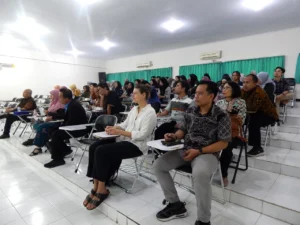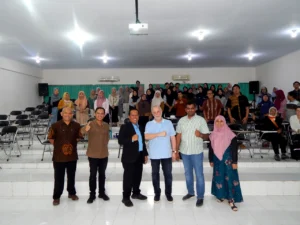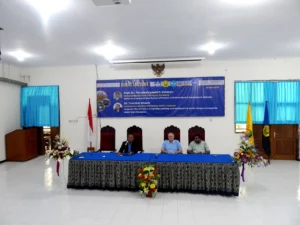 The Department of Biology, FMIPA UNEJ, held a guest lecture related to biomedicine and machine learning (25/4). Two professors from Germany were present, namely Prof. Dr. Thiru. Velavan from Universitätsklinikum Tübingen and Prof. Dr. Claus-Thomas Bock of the Robert Koch-Institut, Berlin. The guest lecture was opened directly by the Dean of FMIPA UNEJ, Prof. Drs. Dafik, M.Sc., Ph.D. Followed by the presentation of souvenirs from FMIPA to the two professors from Germany. Next, Prof. Dr.rer.nat. Kartika Senjarini, S.Si., M.Si., introduces the two processors as collaborators on the Global PACE-UP project, Expert Seminar. The guest lecture session was moderated by Dr.rer.nat. Fuad Bahrul Ulum, S.Si., M.Sc., by inviting Prof. Velavan to start the first speech session.
The Department of Biology, FMIPA UNEJ, held a guest lecture related to biomedicine and machine learning (25/4). Two professors from Germany were present, namely Prof. Dr. Thiru. Velavan from Universitätsklinikum Tübingen and Prof. Dr. Claus-Thomas Bock of the Robert Koch-Institut, Berlin. The guest lecture was opened directly by the Dean of FMIPA UNEJ, Prof. Drs. Dafik, M.Sc., Ph.D. Followed by the presentation of souvenirs from FMIPA to the two professors from Germany. Next, Prof. Dr.rer.nat. Kartika Senjarini, S.Si., M.Si., introduces the two processors as collaborators on the Global PACE-UP project, Expert Seminar. The guest lecture session was moderated by Dr.rer.nat. Fuad Bahrul Ulum, S.Si., M.Sc., by inviting Prof. Velavan to start the first speech session.
Prof. Velava presented for one hour two main topics, namely research on the inventory of mosquitoes as carriers of arboviruses with the title “Spatial and temporal distribution of vectors and associated arboviruses in Vietnam” and material from Tran Duc Khan regarding artificial intelligence for mosquito identification with the title “Mosquito Identification using Deep Learning and Multispectral Aerial Imagery Dataset for Water Body Detection.” Prof. Velavan touched on many types of mosquitoes in Vietnam and pointed out that the types of mosquitoes found in subtropical areas or the northern side of Vietnam are different from the types often found in the southern region of Vietnam, which has a tropical climate.
Research on mosquito distribution based on habitat has been carried out using an artificial intelligence approach to morphological characters, namely photos of the body structure and wings of mosquitoes. It is hoped that from this research a deeper understanding will be obtained regarding variations in mosquito morphology and the viruses that cause the diseases they carry. Guest lecture participants were not only from the biology department but also from the mathematics department, which related to the artificial intelligence material presented.
The second speaker, Prof. Dr. Claus-Thomas Bock, delivered material on the development of hepatitis E virus research with the main title “Current research in Epidemiology and Endemics of Hepatitis E.” During Prof.’s presentation, Bock presents the history of the emergence of the hepatitis virus and the main distribution of the hepatitis virus in the world. In Indonesia, the most widely known types of hepatitis are types A, B, and C. Meanwhile, type D and the new type “E” are relatively new. The most vulnerable sufferers are pregnant women. The main sources of infection are drinking water and pork-based food.
After the discussion presentation session, the moderator, namely Dr.rer.nat Fuad Bahrul Ulum, S.Si, M.Sc, led the discussion with several questions from the audience. Questions that arise include whether the Roberkoch Institute is developing a hepatitis E vaccine (Ask Dr. Fuad). The second question is whether an antibody approach can be used to identify hepatitis E (Dr. Asmoro). Then the third question to Prof. Velavan was related to the relationship between mosquito types and biotic and abiotic factors (temperature, humidity, vegetation type) (questioner: M. Arif, M.Si), whether artificial intelligence using the mosquito sonar approach can be applied (Dr. Kiswara), and whether mosquito morphology can be developed by identification with a smartphone (Dr. Fuad). The guest lecture session ended with a photo session with all participants and presenters. (contributor: Dr. Fuad)

